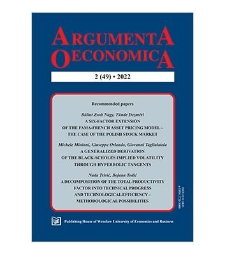Lower Silesian Digital Library contains 109 805 digital objects
Object
Title: A generalized derivation of the Black-Scholes implied volatility through hyperbolic tangents
Creator:
Mininni, Michele ; Orlando, Giuseppe ; Taglialatela, Giovanni
Description:
Argumenta Oeconomica, 2022, Nr 2 (49), s. 23-57
Abstrakt:
Publisher:
Publishing House of Wroclaw University of Economics and Business
Place of publication:
Date:
Resource Type:
Resource Identifier:
doi:10.15611/aoe.2022.2.02 ; oai:dbc.wroc.pl:118463
Language:
Relation:
Argumenta Oeconomica, 2022, Nr 2 (49)
Rights:
Pewne prawa zastrzeżone na rzecz Autorów i Wydawcy
Access Rights:
Dla wszystkich zgodnie z licencją
License:
CC BY-SA 4.0
Location:
Group publication title:
Object collections:
- Lower Silesian Digital Library > Participants of the Consortium > 04. Wroclaw University of Economics > Periodicals published by the University Publishing House > Argumenta Oeconomica
- Lower Silesian Digital Library > Resources > 2. Czasopisma > Czasopisma współczesne
Last modified:
Apr 17, 2024
In our library since:
Nov 21, 2022
Number of object content hits:
584
All available object's versions:
https://www.dbc.wroc.pl/publication/156539
Show description in RDF format:
Show description in OAI-PMH format:
| Edition name | Date |
|---|---|
| A generalized derivation of the Black-Scholes implied volatility through hyperbolic tangents | Apr 17, 2024 |
Objects Similar
Gardoń, Albert
Monmans, Lisette Leoni, Peter Mercken, Roger Houben, Ghislain
Florek, Jan Juzwiszyn, Jacek Misztal, Andrzej Sacała, Jerzy
Wasilewska, Małgorzata
Nawrocki, Piotr
Prymon, Michał
Wilimowska, Zofia Łukaniuk, Małgorzata Galanc, Tadeusz. Redakcja
























